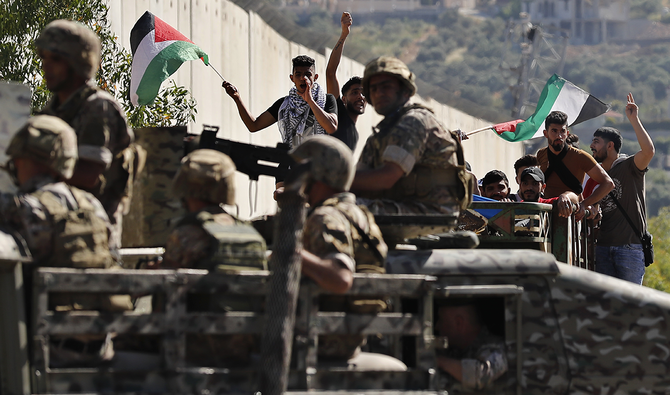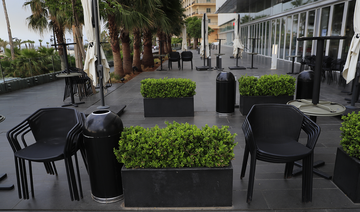BEIRUT: Political and economic figures have expressed their opposition to dragging Lebanon into a regional conflict amid the Palestine-Israel crisis and violent clashes.
The Vice President of the General Labor Confederation Hassan Fakih warned against “taking the country into total chaos that will wipe out what is left of Lebanon.”
His comments come as people returned on Saturday to queueing at gas stations and searching for missing medicines in pharmacies.
Sales of meat have dipped after the price of a kilogram of unsubsidized beef exceeded LBP120,000 ($80).
Fakih said that “matters in Lebanon have reached an unbearable level, as the economic situation has become a real threat to all classes of people.”
He added that the people “have crossed the poverty threshold as a result of the policies adopted by the political system that has been running the country for many years.”
The Lebanese economy is trying to recover from the double losses that it has incurred as a result of measures brought in to control the coronavirus disease (COVID-19) and the devastating economic situation.
Hopes have been raised for economic improvements following a remarkable decline in COVID-19 cases.
Meanwhile, the Lebanese Army on Saturday prevented non-Lebanese residents from crossing to the southern border area amid calls made by Palestinian factions to refugees to protest against the Israeli attacks in the occupied territories.
Hezbollah operatives in civilian clothes participated in the prevention measures in the border area, especially in points close to the Blue Line facing Israeli settlements, indicating that the party has no intention of escalating the situation in Lebanon.
These measures come the day after the killing of Lebanese citizen Mohammed Tahhan, 21, by an Israeli soldier.
One of the activists in the Tyre area who accompanied the protesters to the barbed fence told Arab News: “A group of protesters carrying Palestinian flags and Hezbollah banners tried to cross the barbed wire from the Lebanese side opposite the Mutla settlement on Friday.
“Tahhan stepped forward and broke an Israeli security camera. The Israelis fired at Tahhan, killing him with a bullet in the side.”
Hezbollah mourned Tahhan and participated in his funeral on Saturday in the southern town of Adloun and wrapped his body in the party’s banner.
However, the activist, who knows the Tahhan family, said: “The young man is a leftist and his family members are communists, and they face their plight with silence.”
There were unconfirmed reports that Hezbollah asked a Palestinian faction in Lebanon to claim responsibility for the launch of Grad rockets on Thursday night from southern Lebanon to occupied Palestine, but the faction refused.
On Saturday, the Lebanese Army ramped up security measures on the coastline leading to the south. The soldiers set up checkpoints and checked the identities of those traveling to the border area.
Only Lebanese citizens were allowed to cross, while non-Lebanese needed special permits.
The army closed all roads leading to the Marjayoun area, opposite the settlement of Mutla, in occupied Palestine.
Soldiers prevented four Palestinians who tried to infiltrate the barbed wire fence on Saturday.
Activist Ali al-Amin, who opposes Hezbollah, told Arab News: “The party does not tolerate any Israeli escalation toward Lebanon due to internal and regional conditions, and thus its options are limited.
“If it is true that the Palestinians rejected Hezbollah’s request to take responsibility for the rocket fire, this means that the party’s ability and influence to move the street in Lebanon has diminished. Hezbollah cannot make any mistakes because its cost in light of internal and regional developments is not yet clear.”
Israeli military spokesman Avichai Adraee justified the shooting at the Lebanese and Palestinian protesters and the killing of Tahhan.
The spokesman said: “The suspects acted in an orderly manner and left behind them suspected explosive devices and acted in a manner that revealed their intention to infiltrate into Israel and commit a sabotage operation in Israel.”
Adraee held Lebanon “responsible for what is happening inside Lebanon and anything that starts from it, and it will bear responsibility for any attempt to harm the citizens of Israel.”
Hussein Ezz El-Din, an activist from Tire, said hundreds of Palestinian youths “tried on Saturday to cross the main road to the border area, and some of them came from camps in the far north to protest in front of the border. But a security cordon formed by the army and other security elements affiliated with Hezbollah prevented crossing the street to the Blue Line.”
Ezz El-Din added: “The people in the southern border region are divided into two parts. A section is affiliated with the axis of resistance and is trying, through the events that are taking place, to look for a new victory.
“There is also an axis that is not affiliated with either Hezbollah or any other party, which is apprehensive and adheres to the national interest.”
He added: “Those who are not affiliated with any party have not answered the call to go to the borders to protest despite their full sympathy for the Palestinian cause.
“Some of them even believe that going to the Syrian borders to protest there against smuggling operations is more beneficial to Lebanon and its interests than going to the southern borders because it is nothing more than propaganda.”
While a cautious atmosphere prevailed on the southern border, Lebanon regained its near-normal life Saturday, in light of the lifting of the state of complete lockdown that lasted for two days due to the Eid Al-Fitr holiday.



























